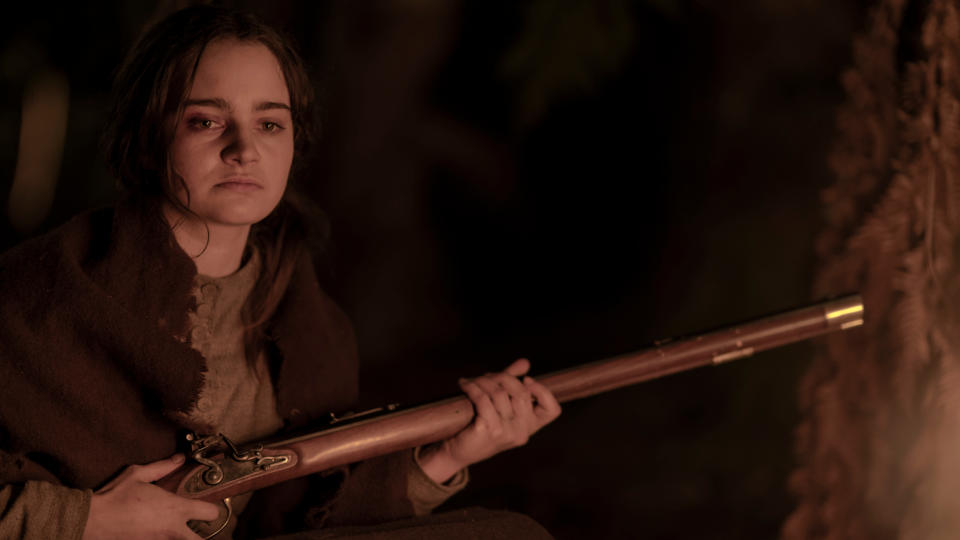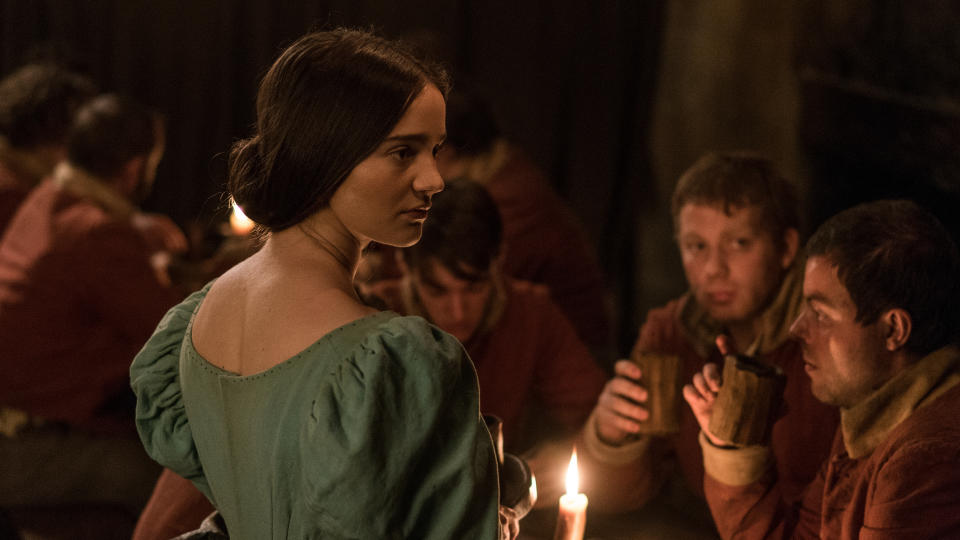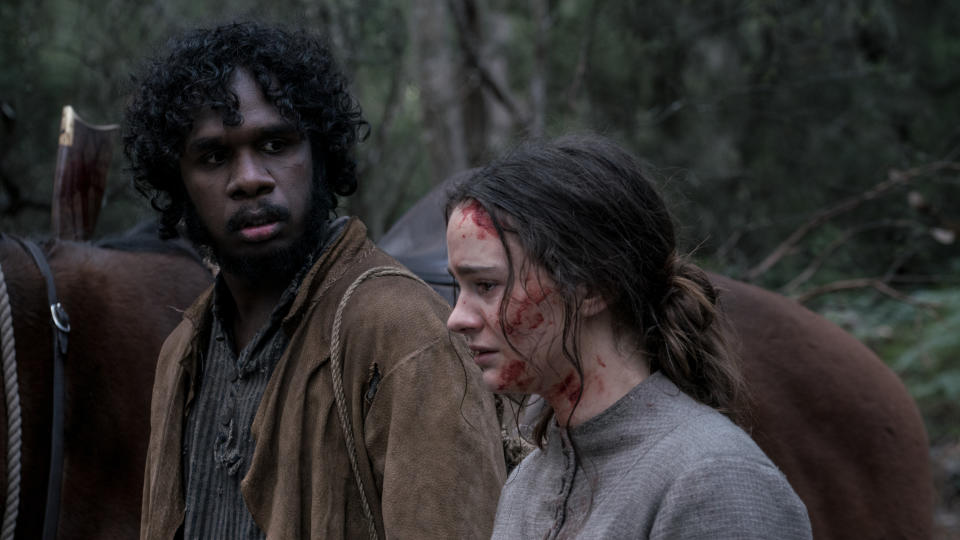'The Nightingale' actor Aisling Franciosi defends the film from critics who called it 'gratuitous'

The Nightingale star Aisling Franciosi says her film deals with the “emotional damage” of sexual violence, rather than focusing on “gratuitous” brutality.
The new film from The Babadook director Jennifer Kent, set in 19th century Tasmania, has been criticised for its scenes of rape and violence against women, but the 26-year-old leading lady believes the extreme content is justified.
Franciosi portrays Irish convict Clare, who engages in a chase through the bush with British Army lieutenant Hawkins (Sam Claflin) in the wake of a horrific act of violence on his part.
“In showing the reality of [the violence], we show the emotional reality more than anything,” she tells Yahoo Movies UK.
Read more: Marc Maron on Joker and movie violence
Franciosi says she could name “innumerable” recent films that feature horrible violence, but have not been criticised in the way The Nightingale has been.
“I really believe that our film is not gratuitous at all. In certain aspects, you rarely see most of the act of physical violence on the body.

“We tend to focus on the emotional damage and you see that through the character’s faces. I think that makes people unbelievably uncomfortable.”
She adds that audiences have become “unbelievably desensitised” to a sort of extreme violence, taking place in a fantasy world which creates a distance between reality and the screen.
Read more: Nudity and sex scene guidelines unveiled
“Something in the way that they’re shot allows us to not see a human being,” says Franciosi. “We just see a body that we don’t know.
“I think [our film] tries to really focus on something being done to a human being. In focusing on the really upsetting emotional damage, we kind of hit a nerve with people.”
Read the full interview, in which Franciosi discusses the intense subject matter of making The Nightingale, the benefit of the female gaze and her experience of accidentally spoiling a massive Game of Thrones moment for her agent.

Yahoo Movies UK: It’s such an interesting film, this one. How familiar were you with Jennifer from her previous work?
Aisling Franciosi: I had seen The Babadook but, interestingly, when I read the script for The Nightingale for the first time, I just scrolled past the title page and so I started reading the script not knowing that she’d written it. I’d already wanted to do it, but obviously I met Jennifer and that made it even more of a project I wanted to be a part of.
And was it daunting to be taking on your first lead in a movie?
I think, by the time we got to shooting, yes I probably felt a little bit of trepidation. But initially, when I was in the auditioning stage, I think I had gone into “actor wanting to prove themselves” mode. I just wanted to get the part in the bag. Once I got cast, I had a moment of “oh okay, now I have to actually deliver and let’s hope I can do that”.
Well I think you absolutely do that. It’s a very physical, powerful performance that works all of your acting muscles. What was it like to have to get into that space?
I think that was one of the things that attracted me. A role of this scope coming along is very rare, so I knew it would definitely be a challenge but one that I really wanted to see if I was up to. It definitely runs the gamut of all of the emotions. It was the most challenging job I’ve ever done. The material is quite sensitive and the subject matter is pretty heavy and devastating. Just physically as well, it was tricky.
For me, it was the emotional side I found difficult. I was surprised at how difficult I found it to deal with the off-set emotions that arose after filming. That took me by surprise. I thought I could just switch it on and off, but I think because of the material we were doing and also, in my research, I got to meet real victims and social workers who shared their stories with me, so it took on a whole new weight of responsibility. I really felt that when we were shooting the more difficult scenes and I found it quite difficult to turn that emotional tap off at the end of the day.
You mentioned your research process. How did you go about the historical side and getting the time period right?

Between getting the part and filming, nine months had passed. At the beginning, I was quite anxious and worrying whether we would ever get the green light. But in retrospect, it was a real blessing because it’s so rare you get that amount of time to prepare for a role. Within that time, I asked Jennifer to point me in the right direction in terms of historical research from the period. I read books mostly about convict history just because I wanted to get Clare’s story into my bones initially.
Once we got closer to shooting, I started educating myself on the Aboriginal history of Tasmania. I also watched numerous documentaries about sexual violence and violence against women. I read up about PTSD and I wrote to the clinical psychologist who had worked on the script throughout its development with Jen. That was fascinating and really helpful in terms of navigating the journey of PTSD.
You mentioned the difficulty of the subject matter and how heavy it is. With that in mind, what was your relationship like with Sam Claflin on the set?
First and foremost, he’s a lovely guy. But early on, there was an initial conversation about Sam and I not hanging out that much in the prep period to keep a slightly distant dynamic between us. As we started workshopping the material, we decided instead that we needed to do the opposite and get to know each other as well as possible, to get to the point where we could really trust each other.
Both for him and for me, we had very upsetting scenes together and I know I wouldn’t have been able to let myself be as emotionally vulnerable and fragile and physically vulnerable if I didn’t trust Sam completely. I think he probably would’ve felt the same. We ended up having a really great relationship. He was really supportive and always comforted me in between takes. He’s a very generous actor and a lovely guy.

The material as a whole has been criticised in some quarters for going too far. What’s your take on how the film finds the balance between showing the reality of it and not going too far?
It’s interesting because, in showing the reality of it, we show the emotional reality more than anything. There are countless, innumerable films in which there is so much violence. Even in the last six months, I can think of two that people almost seemed to relish in. That’s fine because they’re set in a sort of comical world or the director is famous for it and people don’t react to it. I really believe that our film is not gratuitous at all. In certain aspects, you rarely see most of the act of physical violence on the body. We tend to focus on the emotional damage and you see that through the character’s faces. I think that makes people unbelievably uncomfortable.
Read more: Peaky Blinders creator defends violence
I think people can become unbelievably desensitised to the kind of violence we see on screen. Often it’s because it’s in a fantasy world or because something in the way that they’re shot allows us to not see a human being. We just see a body that we don’t know. I think ours tries to really focus on something being done to a human being. In focusing on the really upsetting emotional damage, we kind of hit a nerve with people.
Obviously, the material is in particular quite difficult for anyone who has been a victim of abuse or sexual abuse and it might be too much for them, and that’s fine. It’s not an endurance test and we’d never expect you to sit through it. But on the flipside of that, we’ve had people come up and thank us for showing the truth of what it is and showing the PTSD, which is rarely shown. I had a woman come up to me after a screening in LA and she said: “As a victim of sexual abuse, I feel really understood after watching this film.”
I’m not a believer that you have to shy away from the truth of awful things. People can take it or leave it. Some people will find comfort in it and some will find it too much and that’s fine. I’m proud to be part of a movie that doesn’t try to please everybody.
With that in mind, how important is it to have a female filmmaker involved and to have the story told from that perspective?

I think it makes a huge difference. If you’re going to comment on the violence against the feminine, why not have it told through the female gaze? That’s another thing that I’m really proud of with our film. It’s entirely from the perspective of a female character and she’s never objectified and never sexualised or anything. I think having Jen write that and be extremely sensitive to that made a huge difference. It’s not to say that a man couldn’t tell the story, but I think that Jen being a woman gave her a unique female perspective on this material.
Read more: Michelle Pfeiffer reveals #MeToo moment
I think, interestingly, we have a woman telling this story and people are finding it more uncomfortable than many other films, which are through a male gaze. I think that’s also quite interesting. She really shows the harsh reality of it and some people don’t seem to appreciate that.
I think it’s significant the film is coming out now. A film, particularly told through the female gaze, about this stuff has a real resonance today with #MeToo.
We actually started filming it before #MeToo really began but, as you say, it’s still so relevant today. It’s actually really relevant in lots of other ways too. Fear of the other and being trapped with the other have resonance with anti-immigration. It all plays into the themes of the film. People, for obvious reasons, focus on the violence, but there’s a beautiful relationship between Clare and Billy [an Aboriginal guide played by Baykali Ganambarr].
She is essentially saved by him just being able to treat her like a human being. Despite his trauma and the devastating loss he has suffered and the pain, he is able to treat her like a human being and not leave her to save herself. She goes down the road of violence and “an eye for an eye”, which ultimately just leads to the cyclical nature of violence.
The film has resonated with plenty of people and has been nominated 15 times at the Australian Academy Awards. What’s that sort of recognition like?

It felt really nice. A lot of blood, sweat and tears went into this film. In February, it will be four years since I first auditioned, so it has been quite a long journey. We had the most unbelievable crew and cast. Everyone was all-in and it will be one of those jobs for all of us that we remember because not all jobs are like that. It’s lovely. I’m delighted for Jen and I’m certainly chuffed. I’m just so proud to have been a part of a film that really looks at the dark side of Australian history and has sparked conversations. which I think is only a good thing.
Before you go, I wanted to ask briefly about your involvement in Game of Thrones [as Lyanna Stark]. What was it like to be a part of that phenomenon, particularly with it coming to an end this year?
It was kinda crazy. Weirdly, she’s a huge part of the story, but I have like a tiny role if you know what I mean. So it’s the funny juxtaposition. People ask me about it all the time, but it’s probably the shortest amount of time I’ve ever spent on a set. It just goes to show you the reach and scope of the show and it’s lovely to be a part of something that has had such a huge influence on the pop culture.
Read more: Emilia Clarke heartbroken by Thrones finale reaction
It feels like it was one of the last series where everyone tuned in for it exactly on time. Now in this culture of binge watching, it feels quite rare to find a show that everyone is on the same page with. It was lovely and it’s kind of cool to be able to say that you were a part of it in a small way.
You were part of the big R+L=J fan theory. How hard was it to keep that under your hat?
I’m not gonna lie, I had never seen an episode of Game of Thrones before getting cast, unfortunately for my agent. When I got sent sides, I knew there was some information missing because you can just tell.
I called my agent, who is a huge fan of the show, and I said: “Hey, can you help me out with this scene? I’m not really sure what’s going on?” He was like: “No! I’m so excited, but you’re going to totally ruin it for me”.
The Nightingale is in UK cinemas from 29 November.

 Yahoo Movies
Yahoo Movies 
